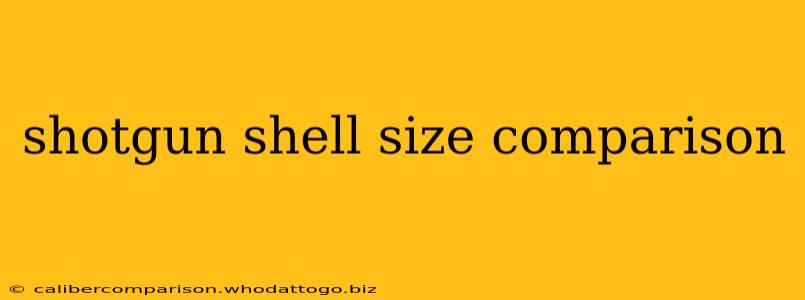Choosing the right shotgun shell size is crucial for both safety and effectiveness. Whether you're a seasoned hunter, a competitive shooter, or a homeowner concerned about personal protection, understanding the differences between various shell sizes is paramount. This comprehensive guide will delve into the specifics of shotgun shell sizes, highlighting their applications and characteristics.
Understanding Gauges and Calibers
Before we dive into specific shell sizes, it's essential to understand the measurement system. Shotgun shells are typically measured in gauge, not caliber. Gauge refers to the number of lead balls, each with a diameter equal to the inside diameter of the barrel, that would weigh one pound. Therefore, a 12-gauge shotgun has a barrel that would accommodate 12 lead balls weighing one pound, while a 20-gauge shotgun would accommodate 20 such balls. The lower the gauge number, the larger the diameter of the barrel and the shell.
While less common in shotguns, some might use caliber, which refers to the diameter of the barrel in inches or millimeters. However, gauge is the predominant measurement for shotguns.
Common Shotgun Shell Sizes and Their Applications
Here's a breakdown of the most frequently encountered shotgun shell sizes:
10 Gauge: The Heavyweight Champion
- Size: The largest commonly used gauge.
- Applications: Primarily used for hunting large game, such as waterfowl or large land animals. Its powerful recoil demands experienced handling. Less frequently seen due to its recoil and weight.
- Characteristics: Delivers immense stopping power but with significant recoil.
12 Gauge: The Workhorse
- Size: The most widely used gauge for various applications.
- Applications: Highly versatile, suitable for hunting, sport shooting (trap, skeet, sporting clays), and home defense. The wide availability of ammunition makes it incredibly popular.
- Characteristics: Offers a good balance between power, versatility, and manageable recoil for most users.
16 Gauge: A Good Compromise
- Size: A less common but still viable option.
- Applications: Often preferred by smaller-statured shooters due to reduced recoil compared to 12 gauge. Suitable for hunting upland game and smaller waterfowl.
- Characteristics: Provides a balance between power and recoil, making it a comfortable option for many.
20 Gauge: Lightweight and Versatile
- Size: A popular choice for smaller shooters and those seeking less recoil.
- Applications: Suitable for hunting smaller game birds and rabbits. Also used in competitive shooting, especially by younger or smaller individuals.
- Characteristics: Offers less recoil and less power than 12 gauge, making it more manageable.
.410 Bore: The Smallest Commonly Available Gauge
- Size: The smallest commonly used gauge for hunting. Often mistaken for a caliber, it's actually a gauge.
- Applications: Primarily used for hunting small game like rabbits and squirrels, or as an introductory gauge for young shooters.
- Characteristics: Least powerful of the commonly available gauges, with significantly reduced recoil.
Choosing the Right Shell Size: Factors to Consider
The ideal shotgun shell size depends on several factors:
- Your Physical Strength and Build: Larger gauges deliver greater recoil. Smaller individuals might find larger gauges uncomfortable or difficult to manage.
- Intended Use: Hunting larger game requires more stopping power than hunting small birds. Home defense needs might favor a powerful but manageable gauge.
- Ammunition Availability: The most common gauge (12 gauge) ensures broader ammunition availability at various price points.
- Target Size and Distance: Gauge selection should correlate with the size of the target and the distance you’ll be shooting at.
Conclusion
Selecting the correct shotgun shell size is crucial for safety and effectiveness. This guide provides a starting point for understanding the different sizes and their applications. Remember to prioritize safety and always handle firearms responsibly. Consult with experienced shooters or professionals for personalized recommendations based on your specific needs and experience level. Further research into specific ammunition types within each gauge will enhance your understanding and proficiency.

